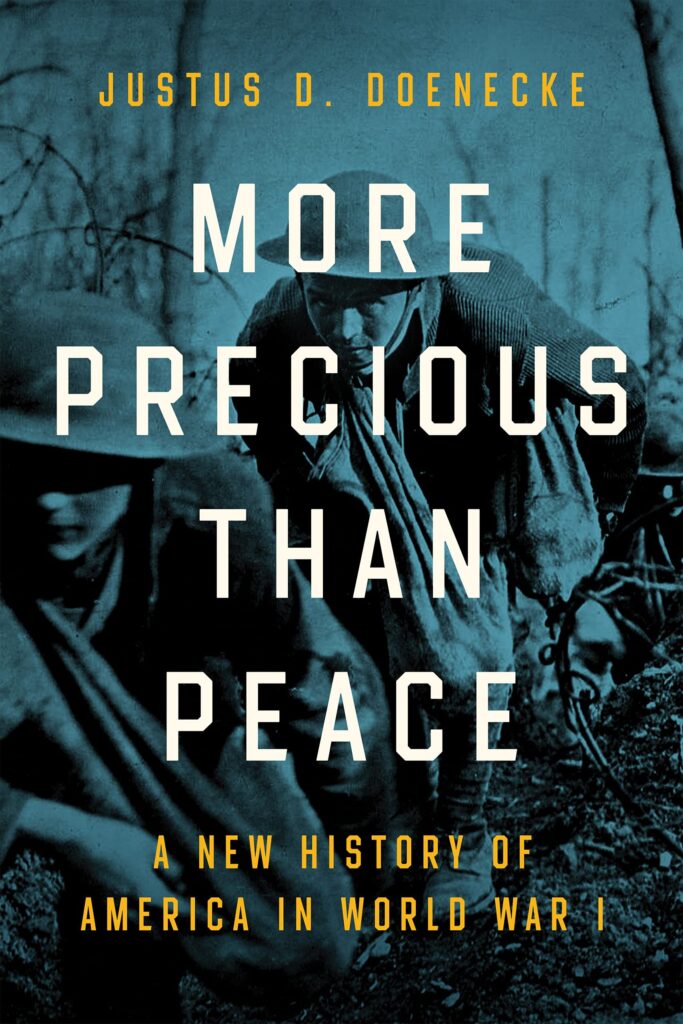Reviewed by CAPT Richard Dick, USN (RET)
Dr. Justus Doenecke has studied intensely the events and personalities involved in the eventual American intervention in World Wars I and II, authoring six books on these topics. The author’s depth of research and knowledge of secondary sources covering the early 20th century in the U.S. greatly strengthens this book, More Precious Than Peace. In particular, he builds on his Nothing Less Than War, a history of the events leading up to America’s declaration of war in April 1917.
More Precious Than Peace examines the American experience in World War I but from a fairly restricted point of view. The author reviews American ground involvement at the operational and strategic levels and makes several pointed observations, such as the reluctance of American commanders to review, learn from, and incorporate the expensive operational and tactical lessons that the British and French had accumulated over the preceding three years. However, he does not narrate in detail the experiences of the American Expeditionary Force on the Western Front. For that, the reader would be well advised to consult Edward C. Coffman’s War to End All Wars or one of several recently published battle histories, such as Matthew Davenport’s First Over There or Edward Lengel’s To Conquer Hell. Similarly, Doenecke reviews the role of the U.S. Navy and the clashes of personality at the higher levels of the Navy (particularly between Navy Secretary Josephus Daniels, Chief of Naval Operations William S. Benson, and Vice Admiral William S. Sims, Commander of U.S. Naval Forces in Europe), but spends little time on naval operations. Paul Halpern’s Naval History of World War I looks more at the details of the war at sea. In the same vein, Doenecke has little coverage of air operations and seems a bit confused on some minor technical details in aviation (e.g., the deficiencies of the Airco DH-4 day bomber). James J. Hudson’s Hostile Skies covers operational and tactical American aviation well.
What makes More Precious Than Peace so valuable is the author’s detailed knowledge of, and insights into the personalities and institutions at the highest levels of the U.S. government and armed services, and his understanding of U.S. public opinion during the war. Doenecke explores in depth the battle over conscription and the evolution of President Wilson’s thinking on war aims, relationships between the U.S., the Allies, and the Central Powers, and the shape of the postwar world. He looks closely at the background and activities of the Committee on Public Information and related public and private organizations involved in monitoring and shaping the views of the American people on the war and on the government. Unlike many histories of the period, he closely examines the American intervention in Russia and weaves it into his history of the war itself.
Dr. Justus D. Doenecke is Professor Emeritus of History at the New College of Florida and has written extensively on the history of the United States in the late 19th century and 20th century. As noted above, over half of his books have dealt with America’s intervention in the two world wars. His Storm on the Horizon: The Challenge to American Intervention, 1939-1941 won the 2000 Herbert Hoover Book Award for best book on any topic of American history within the years 1914–64.
Captain Dick is a retired submariner and also served for over 29 years in the defense intelligence community.
More Precious Than Peace. By Justus D. Doenecke (Notre Dame, IN: University of Notre Dame Press, 2022).


